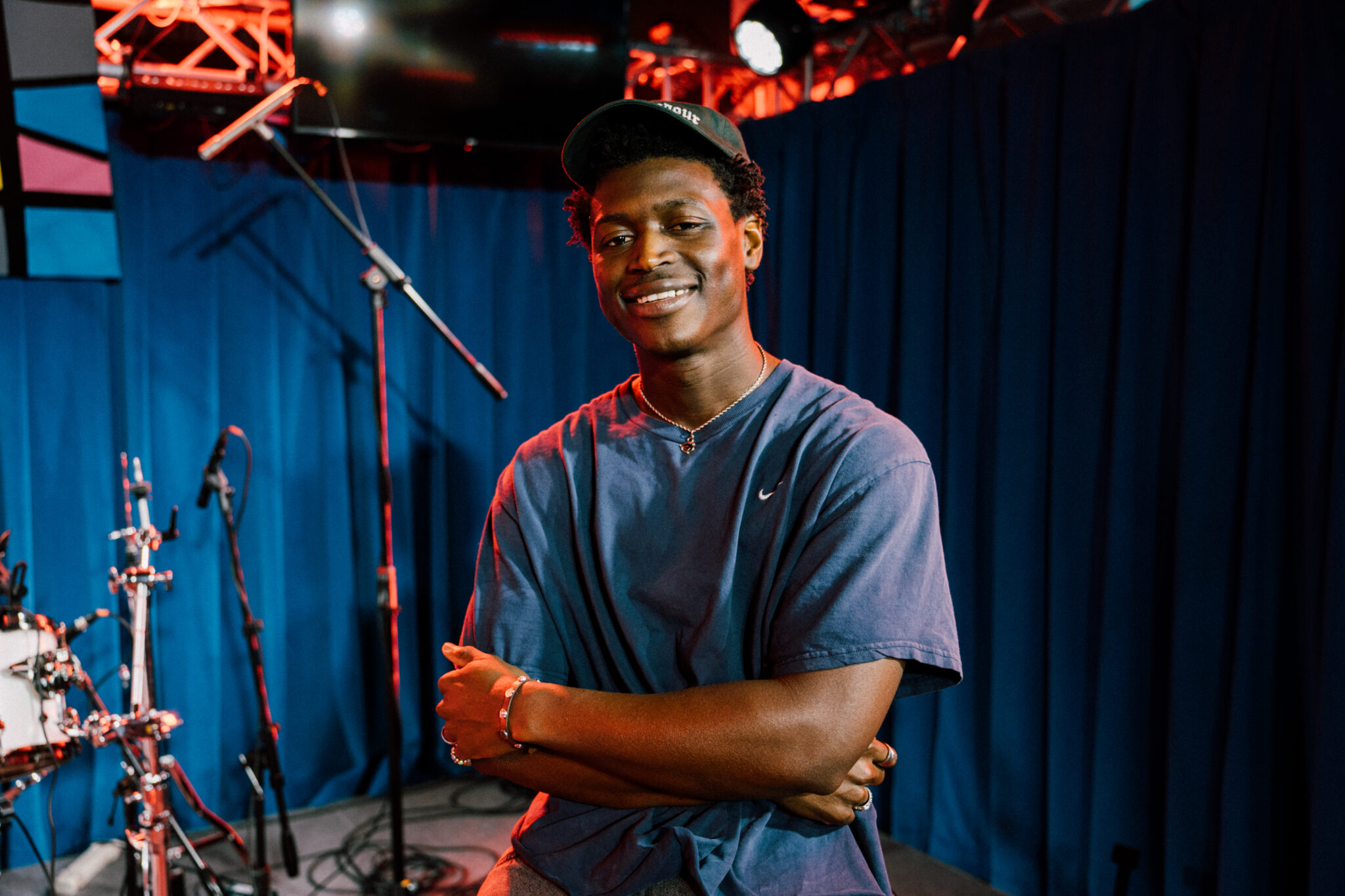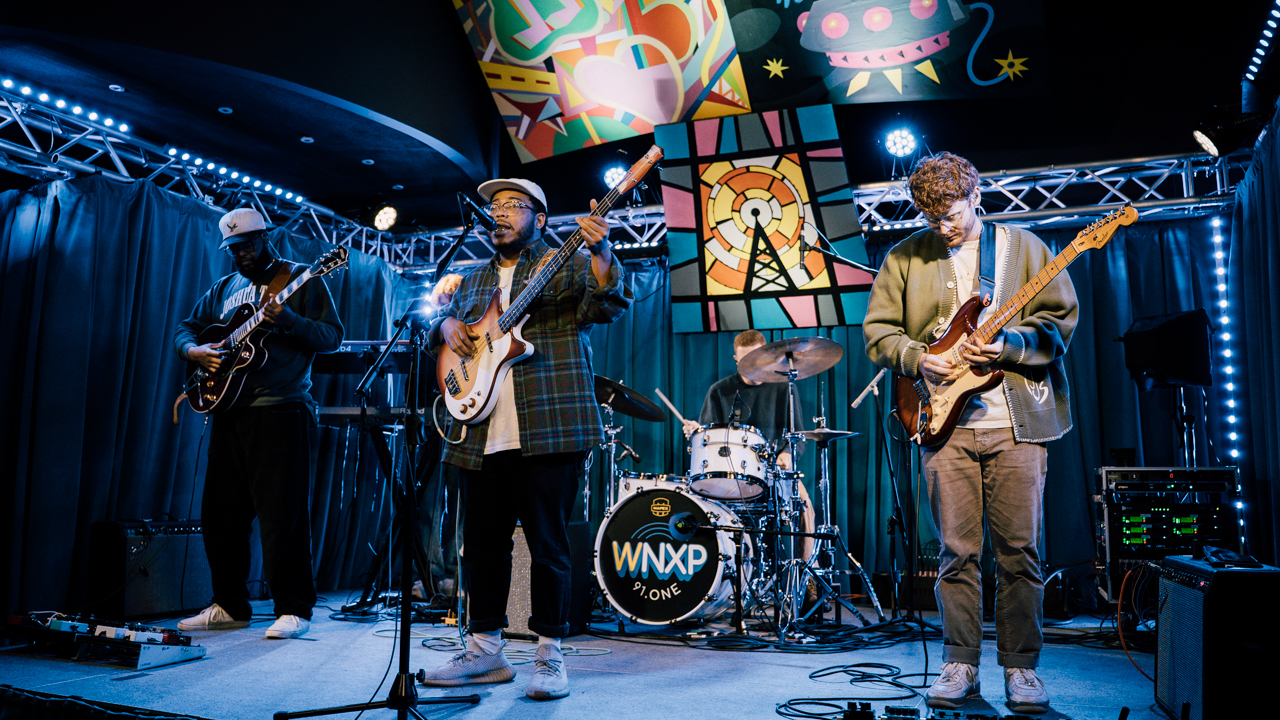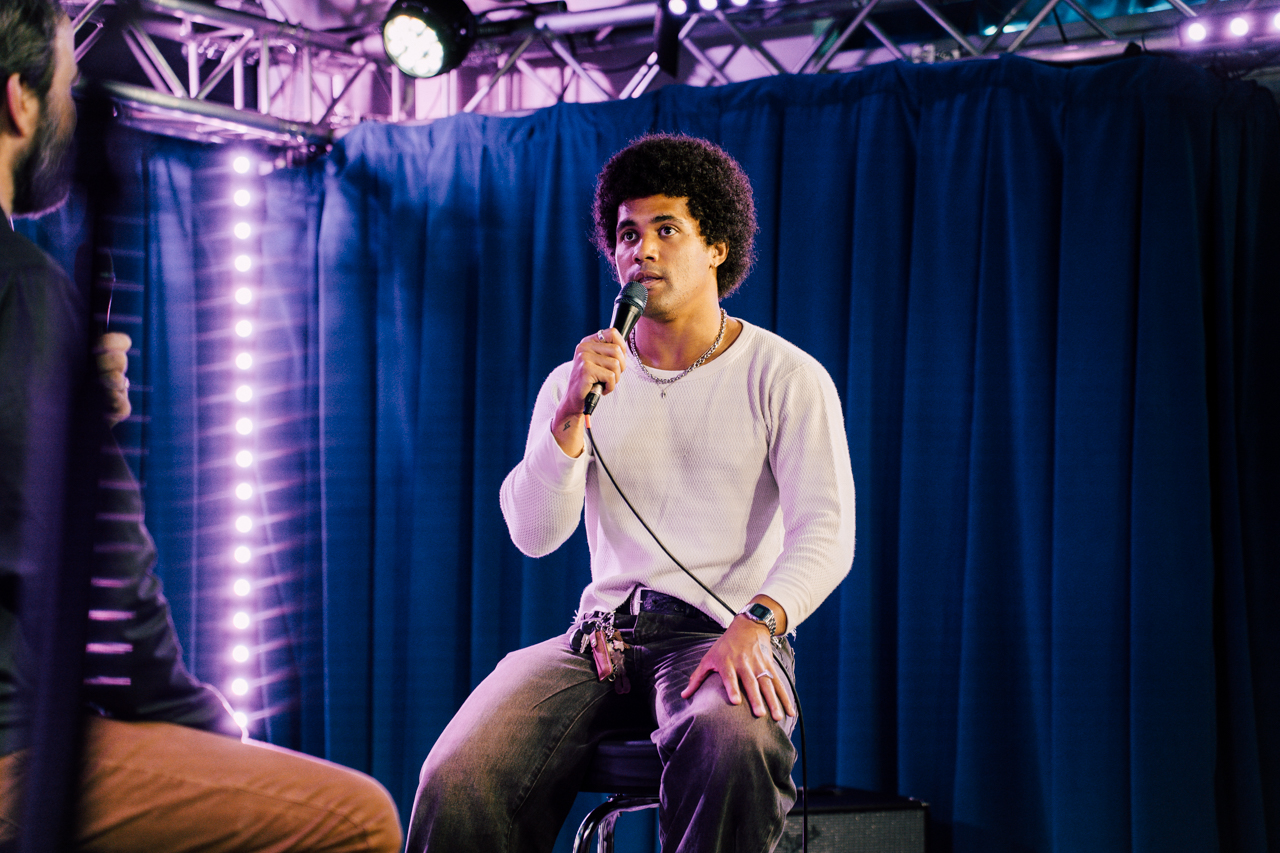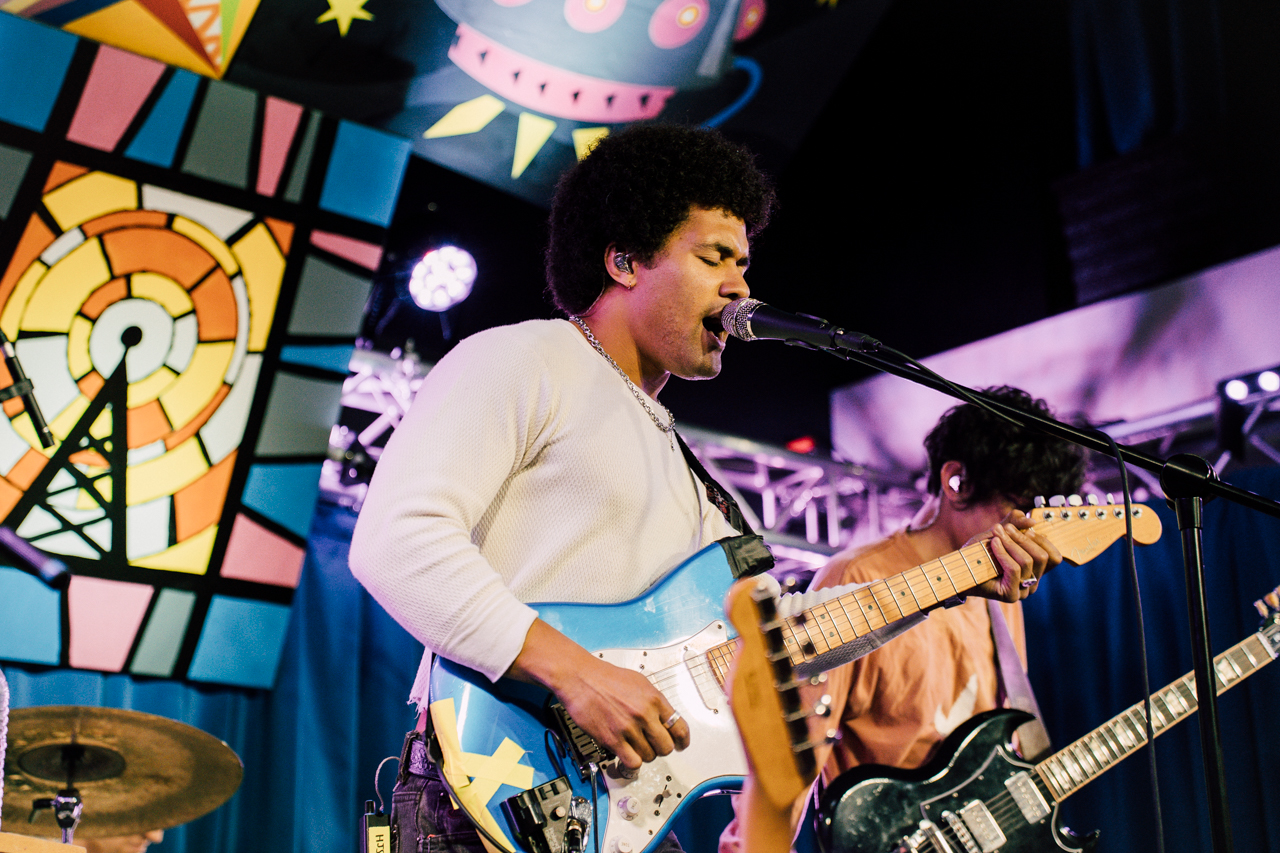Mon Rovîa is an artist who thinks deeply, not only about the music he makes but the impact an artist can have on the greater culture. While most of his songs are tranquil, they are often born from contemplating crisis and growing spiritual turbulence. Yes, that includes the current political upheaval in the U.S. but also larger forces at play in societies around the world. As he revealed in a conversation inside WNXP’s Sonic Cathedral, Mon Rovîa is looking back to Black thought leaders of the 1960s to better understand how he can best navigate as an artist now. He also hit on topics ranging from his TikTok breakthrough to the deep, journalistic credentials of Teen Vogue (seriously). Check out the conversation below, or better yet, listen to it above.
Jason Moon Wilkins: I first became aware of your music in 2021, and it was musically a little bit different than what you’re doing now. There were more beat elements. There were some things that would fall under, maybe alternative R&B. And now you’ve found yourself in, as you described it, this Afro Appalachian folk world. What, for you, was a turning point musically where you said, “Oh, this is my voice and this is where I want to go?”
Mon Rovîa: I think I got more comfortable with myself. Since I was young, I’d always listened to a lot more singer songwriter types of music. Whether it was Fleet Foxes or Bon Iver, growing up, those are people that I kind of looked to. But at the time when I was doing ‘Dark Continent,’ rap was more at the forefront of music, so I wanted to experiment more with different things and see if I could find a footing in that. And the project didn’t do exactly what I was hoping at the time, and I remember Eric, one of my good friends who also works on the team, he was like, “Hey man, why don’t you just go on TikTok? You’re great with the ukulele, you’re writing these awesome songs that no one’s hearing. Why don’t you just go on there and just see if you can just be true to yourself on that?” And so, I think it was December 2022, every day, just kind of going on TikTok Live and playing for people in the mornings. I only played originals and we started to foster a community. And that really is what I think pushed me to keep going in this way, I started to find people who actually liked what they were listening to. So that really helped me find my voice and be comfortable.
JMW: Was the ukulele as an instrument helpful, too? It’s something that obviously features pretty predominantly on everything you’re doing now. Was that marriage of your voice and that instrument also like, “Oh, this feels good?”
MR: Yeah, it did feel good. I think something that attracted me to the ukulele was the simplicity. I don’t think I’m anywhere close to being a crazy instrumentalist or good at chords or anything like that. I like finding simple melodies, and then I was able to write deeper things because of that, and really just hear the lyrics, and the ukulele helped me with that. And the voice kind of changed with the instrument. It brought out a different sound in me, one that I didn’t know I really had.
JMW: I had been following your career. You had played some shows here, I’d seen your name. We started playing the song “Bone” a little bit, too. And then it was one of those things where, when I checked back in on you, you had gone from a certain amount of plays on Spotify to a BUNCH more. I was like, “Oh man, what happened?” What do you attribute that to?
MR: Yeah, I would say TikTok is a big part of it. Gaining that audience was huge and learning social media strategies that would help push the music to more people. I think getting out of my own way and not getting too serious, being able to be silly, and also to bring value to people was a big part of what we realized was what people were looking for at the time. There’s a shift in music now where people are not really into a lot of the ego and different types of like, all the gold and diamonds. They’re looking for things that can really help change and answer questions about what life is with all the things that are going on. So I think our mission of really speaking to deeper heart issues has helped us.
JMW: Well, I hear a lot of hopefulness in your music. I also hear a lot of religious imagery. I was reading [an article]. Shout out to Teen Vogue, by the way.
MR: Shout out Teen Vogue.
JMW: They have the best article on you, period. It was deep.
MR: Yeah, it was deep, man.
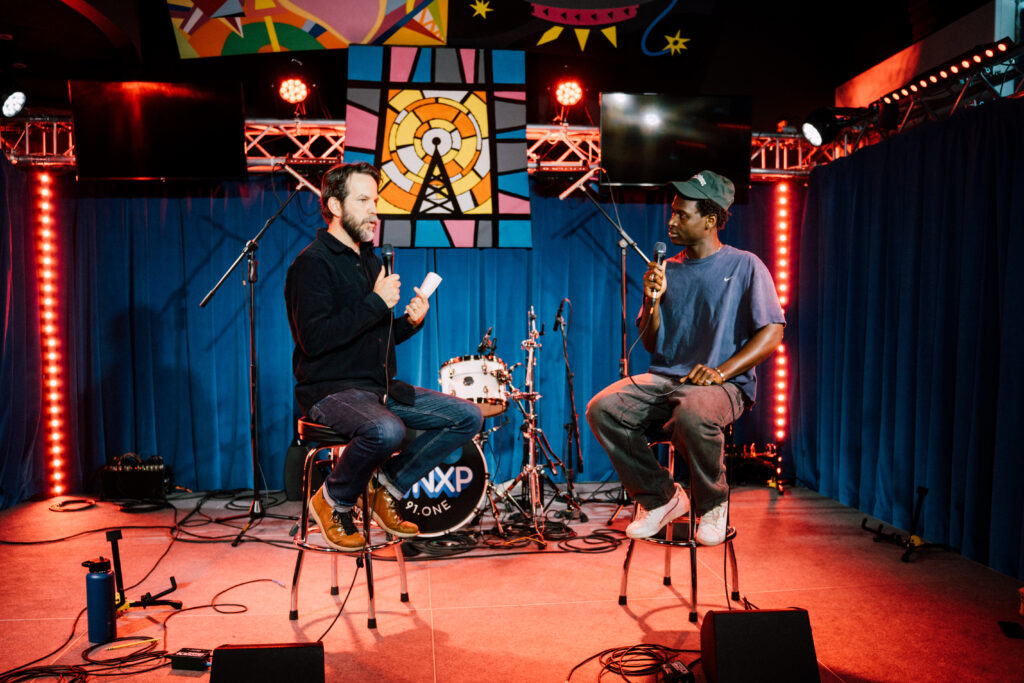
JMW: One of the things that you talked about in that article is being raised in a religious household where you weren’t even necessarily exposed to what people south of the Mason Dixon call “secular music” until your teen years. And I hear this show up in your lyrics. You’re talking about Jordan, you’re talking about the furnace. Is this something that you’ve heard back from fans, people who listen to your music of various different faiths who connect with this because it does seem rooted in something deeper?
MR That’s a great question. I don’t think I’ve paid too much attention to or at least I’ve not heard too many of my fans speak too much to the religious aspect, which is interesting because a lot of my music is coded. Just trying to understand my own growing up and the different intricacies and the relationship with religion in general. So I love that you asked that question because I do think life is very spiritual, whether you believe in anything or not. There are things that move without your control. We don’t have much power over a lot of things in life. And so there’s always that question of, “What is the unknown hand? What are these things that we are susceptible to in our lives that we don’t know?” So I try to play on these themes a lot in music to have people question. I enjoy that and it also helps me dive deeper into my own complexities with my own faith and how I see the world as well.
JMW: You gave us a handpicked playlist for this Artist of the Month program, and in your description, you said that it might surprise people that you don’t listen to a ton of music, but that a lot of your inspiration comes from what you read. But you left us hanging, not telling us what you’ve been reading! So, is there something, even in the last year or two, that you’ve read that that has directly inspired your music?
MR: I would say a lot of James Baldwin’s writings. I’m currently reading a lot of his different essays and things. It’s actually a lot going into the civil rights era too, like right now I’m reading an Amiri Baraka book about the different layers of Dante’s Inferno, and he’s basically talking about the black experience and puts it in these different layers, playing on the themes of Dante’s Inferno. I really am trying to understand a lot of their process, how they fought social injustice and the mirroring of that time and these times. What can we take from there to speak into now is super important.
JMW: I’ve been thinking about this same topic a lot lately, because when you look at particularly turbulent times, a lot of times the music rises to meet it. Late 60s soul music, 70s punk. The conscious hip-hop of the late 80s, early 90s. So far this moment is a little different. There’s a lot more sort of what one artist recently called “diary entry music.” We are entering an even more turbulent time potentially, if the last month is any indication, and I wonder, how do you see the role of an artist, a songwriter in a time like this?
MR: I think you’re going to have to accept at times being loved by many and at other times being on the outside and scrutinized. I think as an artist, truth has to be the epicenter. We have songs that will be coming out that are a little bit more forward in certain aspects, but whatever I talk about, I have to know that what I’m doing, it won’t bring everybody along. But you have to be okay to just bring some. And you have to be happy with those that do see the truth of the matter and accept that. I don’t think you can clearly bring everybody into this awakening, but the truth is, there is a big conscious revival going on around the world right now in many countries. That’s why there’s so much unrest. So many people just don’t want to be in a daze anymore. They’re seeing the webs that have been spun for the first time, in many places. And they are willing to use their voices to untangle those things. This is the most important time for an artist to be able to use their voice and not be afraid of maybe the consequences that could happen. You won’t be loved all the time, so hopefully you can find something deeper to push you, because the love of the people all the time is never going to satisfy. And, so, hopefully, the music can carry you through.
“This is the most important time for an artist to be able to use their voice and not be afraid of maybe the consequences that could happen.”
Mon Rovia
JMW: I was reading in a recent article more deeply about your journey as a refugee from Liberia. For you, in this moment where, literally in the last week, there are organizations who are having to halt some of their programs, I imagine this has been on your mind. You’ve been an outspoken advocate for people who are doing that work, helping people from various different places, similar to your situation as a child in a war torn country that was not safe for you.
MR: Yeah, it is on my mind. It’s a really, really heavy time. The only thing I can really hope is that those people that are striving for these good things, who are striving for others, continue to be just as radical as the actions that are being taken against all the good, right? And that’s what we have to do in this period. Hopefully we can all come together, on this side of things and, and be just as loud, and force things back. We can’t shy away from it.
JMW: Listening to the new EP, Act 4 – Atonement, I particularly love the song “Dead Man Walking,” and I wanted to see if you wouldn’t mind talking a little bit about that.
MR: I think about my own life, and the tales of Lazarus. That was a big theme of that whole idea. And for me, I remember being in a pretty dark place at the time, and I think about everyone’s dark night of the soul. I think some people think that you can’t come back, or it’s too soon for you to come out of something, like say you were addicted to something or maybe you’ve had a difficult past, or whatever that may be. The “too soon” line is almost like the people telling me, “It’s too soon, like, don’t trust this person. Like, don’t trust this man, he’s not ready to come and do good or influence whatever is going on.” But, really, it’s a call for people to realize that they can come out of that grave, that place, and whatever time that is. It’s always different for each person. And to really trust that if someone’s really trying to push good, regardless of the past that they may have had, to welcome them and let them go and do those things. So, yeah, that’s one of my favorite songs on that project, too.
JMW: You’ve described your music as Afro Appalachian folk, and you’ve talked about your own journey into discovering the role that African Americans played in essentially creating some of the genres that are now thought of as “white” – folk music, country music… There are other artists who dive deep into this topic and some either live in Tennessee or have lived here like Rhiannon Giddens, Allison Russell, Joy Oladokun. Have you connected with any of those artists?
MR: No, I haven’t. I really hope I do in the future. I know they’re legends and would teach me so much more about just the history of it all. In a sense, the history of Afro Music in just the South found me because I happen to be in Chattanooga. Knowing a little bit about it, like, say the banjo is from Africa. Like all of these little things that you hear. But then diving into it and realizing how folk music was whitewashed over time and became what it is now. And it gave me a lot of energy to even be a little bit more proud of being in that space. It’s hard. There are a lot more African Americans popping up now with guitars and things like that and realizing that they don’t have to fall into… Of course, rap is one of the most beautiful things and directions you could go in into music, but I do think at times, at least the youth, I think can feel pigeonholed into that experience. And it’s nice to know that you can go a softer way and speak from the heart in a different texture.
JMW: Well last thing – you teased a little earlier that you’ve got some more music coming. What does this new year look like for you? You’re obviously starting it with the EP coming out and you don’t have to be in a rush to do anything else, but what else might be on the horizon?
MR: Yeah, we’ve got a lot of great songs on the way and hopefully we get out a project that’s a little bit bigger and a little bit more vast, explaining more of the story and more of my life that I’ve yet to tell. So, there will be more music this year and I really am looking forward to, I think, inspiring and more people with music.

